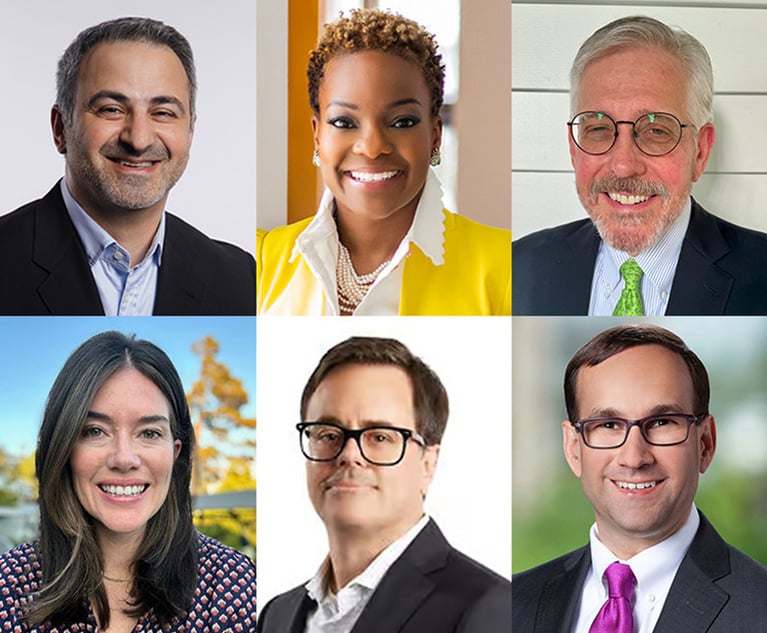Are Privacy Laws and AI Advancements Ready to Co-Exist?
The global AI race continues onward but countries with stringent privacy data protections in place could find themselves at a clear disadvantage.
February 07, 2020 at 02:17 PM
4 minute read
The original version of this story was published on Legal Tech News

While there may be a time when AI and privacy can learn to peacefully co-exist in the U.S, it doesn't seem to be on the horizon anytime soon. The "What You Don't Know Will Hurt You: Artificial Intelligence vs. Individual Privacy Rights" session at Legalweek 2020 in New York delved into the tension between the desire to maximize AI benefits and the lingering gaps in the technology that have yet to be addressed by the law.
Most of those problems begin with data, which is both the fuel that makes AI function and a protected commodity under privacy laws such as the EU's General Data Protection Regulation (GDPR) and the California Consumer Privacy Act (CCPA).
However, panelists alluded to the reality that many countries don't always share the same privacy concerns, which makes for an uneven playing field when it comes to technological competition.
"Can a society that restricts information compete in a big data society with countries that have more data available to them?" asked Gordon Calhoun, a partner and chair of the e-discovery, information governance and compliance practice at Lewis Brisbois Bisgaard & Smith.
Even before the AI component factors into the equation, a big data society by its very nature may be incongruous to a global landscape that is increasingly dominated by privacy laws. Calhoun pointed out how quickly data tends to multiply once it is acquired, copied, stored or passed from hand to hand. While regulations like GDPR may tout a user's right to be forgotten, that may be easier said than done.
"The ability to be left alone, the ability to be forgotten is aspirational," Calhoun said.
AI complicates the problem since it relies on data in order to learn and derive insights, something that many organizations operating within the U.S. have already taken advantage in order to streamline fundamental business practices and monitor productivity. But the data needed to drive those insights may be drying up.
For example, Calhoun pointed to technology like sentiment recognition, which can be used to monitor factors such as an employee's facial expression to infer their overall level of satisfaction on the job. The tool may be particularly useful to tech companies and other industries that have patents and trade secrets to protect and would likely benefit from early warning signs that a worker may be considering jumping ship.
But however useful, such applications may soon find themselves running afoul of the law. After a one-year grace period, the same protections that apply to other kinds of personal data will apply to employee information under the CCPA. Jarno Vanto told Legaltech News last October that some of those tools may have to be tweaked in order to avoid scuffles with the law.
"I think that's going to force companies to rethink how they are using those tools. They might be moving away from more personally identifying stuff to more aggregate tracking," Vanto said.
But the real stumbling block for the continued growth of AI may have more to do with its failures than successes. Panelist Joe Gervais, chief information security officer at Brightside Benefit, indicated that AI might not yet be as smart as people think it to be in terms of deriving context. He alluded to AI-based solutions that an employer could use to screen potential candidates based on their Twitter feed. Tweets in support of a charity with an expletive in its name could be misinterpreted by an AI as indication that a job applicant has problems with anger.
"We're worried about the tyranny of artificial stupidity," Gervais said.
|This content has been archived. It is available through our partners, LexisNexis® and Bloomberg Law.
To view this content, please continue to their sites.
Not a Lexis Subscriber?
Subscribe Now
Not a Bloomberg Law Subscriber?
Subscribe Now
NOT FOR REPRINT
© 2025 ALM Global, LLC, All Rights Reserved. Request academic re-use from www.copyright.com. All other uses, submit a request to [email protected]. For more information visit Asset & Logo Licensing.
You Might Like
View All
'Biggest Influencer Scam of All Time'?: PayPal Accused of Poaching Commissions Via Its 'Honey' Browser Extension


'Be Comfortable Being Uncomfortable': Pearls of Wisdom From 2024 GC Q&As
Law Firms Mentioned
Trending Stories
- 1GCs Must Act Now to Prepare for the Trump Administration’s First Months
- 2Appreciating the Important Work the Middlesex County Civil Bar Panel Does
- 3Patent Disputes Over SharkNinja, Dyson Products Nearing Resolution
- 4Freshfields Name Change Becomes Official
- 5Lawyers on TikTok Seek the Right Mix of Substance and Levity
Who Got The Work
Michael G. Bongiorno, Andrew Scott Dulberg and Elizabeth E. Driscoll from Wilmer Cutler Pickering Hale and Dorr have stepped in to represent Symbotic Inc., an A.I.-enabled technology platform that focuses on increasing supply chain efficiency, and other defendants in a pending shareholder derivative lawsuit. The case, filed Oct. 2 in Massachusetts District Court by the Brown Law Firm on behalf of Stephen Austen, accuses certain officers and directors of misleading investors in regard to Symbotic's potential for margin growth by failing to disclose that the company was not equipped to timely deploy its systems or manage expenses through project delays. The case, assigned to U.S. District Judge Nathaniel M. Gorton, is 1:24-cv-12522, Austen v. Cohen et al.
Who Got The Work
Edmund Polubinski and Marie Killmond of Davis Polk & Wardwell have entered appearances for data platform software development company MongoDB and other defendants in a pending shareholder derivative lawsuit. The action, filed Oct. 7 in New York Southern District Court by the Brown Law Firm, accuses the company's directors and/or officers of falsely expressing confidence in the company’s restructuring of its sales incentive plan and downplaying the severity of decreases in its upfront commitments. The case is 1:24-cv-07594, Roy v. Ittycheria et al.
Who Got The Work
Amy O. Bruchs and Kurt F. Ellison of Michael Best & Friedrich have entered appearances for Epic Systems Corp. in a pending employment discrimination lawsuit. The suit was filed Sept. 7 in Wisconsin Western District Court by Levine Eisberner LLC and Siri & Glimstad on behalf of a project manager who claims that he was wrongfully terminated after applying for a religious exemption to the defendant's COVID-19 vaccine mandate. The case, assigned to U.S. Magistrate Judge Anita Marie Boor, is 3:24-cv-00630, Secker, Nathan v. Epic Systems Corporation.
Who Got The Work
David X. Sullivan, Thomas J. Finn and Gregory A. Hall from McCarter & English have entered appearances for Sunrun Installation Services in a pending civil rights lawsuit. The complaint was filed Sept. 4 in Connecticut District Court by attorney Robert M. Berke on behalf of former employee George Edward Steins, who was arrested and charged with employing an unregistered home improvement salesperson. The complaint alleges that had Sunrun informed the Connecticut Department of Consumer Protection that the plaintiff's employment had ended in 2017 and that he no longer held Sunrun's home improvement contractor license, he would not have been hit with charges, which were dismissed in May 2024. The case, assigned to U.S. District Judge Jeffrey A. Meyer, is 3:24-cv-01423, Steins v. Sunrun, Inc. et al.
Who Got The Work
Greenberg Traurig shareholder Joshua L. Raskin has entered an appearance for boohoo.com UK Ltd. in a pending patent infringement lawsuit. The suit, filed Sept. 3 in Texas Eastern District Court by Rozier Hardt McDonough on behalf of Alto Dynamics, asserts five patents related to an online shopping platform. The case, assigned to U.S. District Judge Rodney Gilstrap, is 2:24-cv-00719, Alto Dynamics, LLC v. boohoo.com UK Limited.
Featured Firms
Law Offices of Gary Martin Hays & Associates, P.C.
(470) 294-1674
Law Offices of Mark E. Salomone
(857) 444-6468
Smith & Hassler
(713) 739-1250







